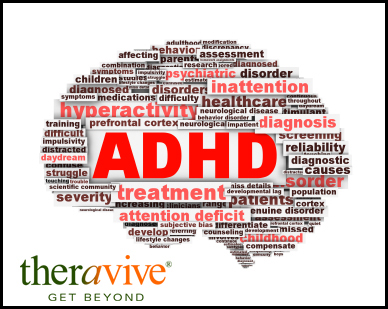 ADHD is a learning disability that occurs in both children and adults, and can play a significant role in someone's life. The issue is, of course, if you know how to deal with it. Your attention may be all over the place, or you may have a hard time completing tasks because of this disorder. That being said, there are a lot of ways that you can deal with ADHD, whether the case of ADHD in question is for an adult or a child. We're going to look at exactly how ADHD affects a person's life and then give you some tips that you can use in order to live a more productive, happier, and less stressful life, even with the effects of ADHD on your life.
ADHD is a learning disability that occurs in both children and adults, and can play a significant role in someone's life. The issue is, of course, if you know how to deal with it. Your attention may be all over the place, or you may have a hard time completing tasks because of this disorder. That being said, there are a lot of ways that you can deal with ADHD, whether the case of ADHD in question is for an adult or a child. We're going to look at exactly how ADHD affects a person's life and then give you some tips that you can use in order to live a more productive, happier, and less stressful life, even with the effects of ADHD on your life.
How Does ADHD Affect a Person's Life?
The answer to this question depends on which type of ADHD the diagnosis is. There are two major types of ADHD; ADHD, Inattentive Type (better known as ADD; the DSM-V lumped the two together into the ADHD category) and ADHD, Hyperactive Type (which is what ADHD used to always be known as). The reason that they were combined into one category is because there are usually overlapping symptoms (specifically, some with Inattentive Type would show some symptoms of hyperactivity anyway, but they would not be the primary focus of their diagnosis and likely did not cause problems for the person in question). We are going to look at both categories in more detail so that you can see how they may affect your life.
ADHD - Inattentive Type. ADHD, Inattentive Type, will affect your ability to be productive. It may make it difficult for you to complete tasks or organize your home or work. It may make it difficult for you to have a conversation with others, possibly because you don't fully "get" what they're saying or because you forget what you're saying in the middle of your sentences. You may also struggle with memory and learning information if you are dealing with the symptoms of ADHD, Inattentive Type. Some people with ADHD, Inattentive Type may also struggle with other mental health issues; anxiety is a common partner because of how stressful it can be to deal with ADHD.
ADHD - Hyperactive Type. ADHD Hyperactive Type will cause many of the same struggles that Inattentive Type does, but it also has a few more that it tacks on as well. You may notice that you have an inability to sit still for long periods of time. You may fidget endlessly, or talk too much. You may interrupt people when they are talking or you may have a hard time holding a conversation with people. Concentration, like with ADHD, Inattentive Type, is also a struggle due to some of these things. You may have an excess of energy and feel unable to "come down" off of being hyper as well, which can cause problems at home, at school, and in the workplace.
Obviously, these are not the only things that can happen, because everyone's case of ADHD is different and they have other life circumstances that may coincide with them to make you or your child's symptoms different than the ones that are listed here.
What Can You Do To Deal with the Symptoms of ADHD?
There are literally hundreds of things that you can do in order to make sure that your ADHD symptoms stay under control. Here are just a few of them that you can use and try for yourself so that you don't feel so stressed out or overwhelmed by every day life. Other options, as always, can be discussed with your mental health professional for best results.
Stay organized. This is perhaps the hardest part, but you have to try to stay organized in order to stay on top of ADHD. I have ADHD, Inattentive Type, and one thing that I always do is make lists. I make lists of absolutely everything so that I can stay on top of things without any problems. If you have to break down your work week into bite sized chunks in order to stay organized, you want to do it. It may take a little bit of time out of your week, but you'll see that you save time in the long run because you aren't as distracted as you could have been.
Try to minimize distractions; work in a quiet place if you can. This is really hard, because we live in a world where a lot of people work in office spaces with a lot of people around, and we have phones and the Internet at our fingertips. But you have to do everything that you can to make sure that your distractions are kept at a minimum. Put headphones in at work, if you're allowed. Don't allow 15 different windows to be open when you're trying to do something on your computer. Don't allow people to distract you from what you're doing, and try to minimize the number of people that are around you. It will help keep you focused, it will prevent distractions, and it will help stop the temptation of talking to a million people when what you need to be doing is working.
Take breaks when you need to. Sometimes, your brain just doesn't do what you want it to do anymore. And that's okay - it's really hard for us to make sure that we are getting everything done in a reasonable amount of time, and if we're stressed out or freaked out, the symptoms are just going to get worse. So go outside, take a walk, relax, meditate, even just get up and go to the bathroom. Walking away for a few minutes can help to reduce your stress and help to refresh your mind so that you can keep working and keep moving forward.
Start taking care of your body by eating right and exercising. Our diet is closely related to everything that we do, yes, including our ability to work with ADHD symptoms. There are foods that you should downright avoid with ADHD; talk to your medical professional about which ones are the worst for your issues or that will counteract your efforts. You should also start exercising as well - exercising doesn't only keep your body in shape, it also helps you to reduce stress, which will help to at least reduce, if not temporarily alleviate, some of the the symptoms that you may be fighting on a regular basis. Not to mention, it's good for your body as well.
 If you have a child with ADHD, play games with them or switch tasks frequently to keep their attention. Children with ADHD are a totally different story, because they have to deal with school on top of everything else. Their attention is all over the place, and then they have to sit there in school for a number of hours before they go do the stuff that they enjoy? It's a rough life. Some people send their children to special schools for ADHD students; others may decide to homeschool because it's just that much more beneficial for their child to be in that environment with their case of ADHD. It depends on you and it depends on your child to figure out what the best path for you will be. All that being said, if you're helping your child with homework or you're teaching them, make sure that you do everything possible to keep their attention. Switch topics or tasks so that your child doesn't get "bored." Play games with them so that their minds are engaged and so that they don't feel like they're just "doing school." You will have to get creative with this, but if you take the time to get creative, you'll find that it really helps both you and them to cope with ADHD.
If you have a child with ADHD, play games with them or switch tasks frequently to keep their attention. Children with ADHD are a totally different story, because they have to deal with school on top of everything else. Their attention is all over the place, and then they have to sit there in school for a number of hours before they go do the stuff that they enjoy? It's a rough life. Some people send their children to special schools for ADHD students; others may decide to homeschool because it's just that much more beneficial for their child to be in that environment with their case of ADHD. It depends on you and it depends on your child to figure out what the best path for you will be. All that being said, if you're helping your child with homework or you're teaching them, make sure that you do everything possible to keep their attention. Switch topics or tasks so that your child doesn't get "bored." Play games with them so that their minds are engaged and so that they don't feel like they're just "doing school." You will have to get creative with this, but if you take the time to get creative, you'll find that it really helps both you and them to cope with ADHD.
Talk to someone about it and develop an appropriate treatment plan. Above everything else, you don't want to try and do it on your own. Whether you have adult ADHD or your child has ADHD, you want to make sure that you're getting help from an outside source to make sure that you are getting everything that you need in order to move forward with your life. There are a lot of things that need to be considered, and a medical or mental health professional has the ability to help you figure out a game plan that is beneficial for you. They can also work with you to tweak your plan and give you suggestions on how to expand your plan in a way that will help you succeed. There are plenty of people that we have referenced here on the site that you can check out and go to about ADHD and other similar issues, so don't feel like you have to navigate the waters alone. Get the help you need and the journey will be that much easier for you to get through and you will have a lot less stress and exhaustion on account of ADHD.
There are a lot of things that you can do in order to take care of your ADHD or your child's ADHD. It may take some time and patience, but if you invest in it, you will find that it is a lot easier for you to cope with the symptoms of ADHD. Medication is definitely not always needed, but in some cases, it can help with treatment as well. Consult with your mental health professional or your doctor in order to get more information and to decide whether or not medication could be beneficial for your particular situation. As always, your mental health professional is always the best place to get your information.
_________________________________________________________________________________________________________________________________
Hallowell, E. M., & Ratey, J. J. (n.d.). Adult ADHD: 50 Tips of Management. Retrieved June 24, 2014, from http://www.drhallowell.com/adult-adhd-50-tips-of-management/
Low, K. (2010, March 8). ADD and Work Tips - ADD and Work Tips from Adults With ADD. Retrieved June 24, 2014, from http://add.about.com/od/adhdinadults/a/Work-and-ADD.htm
Segal, J., & Smith, M. (2014, February). ADD / ADHD and School. Retrieved June 24, 2014, from http://www.helpguide.org/mental/adhd_add_teaching_strategies.htm
Tartakovsky, M. (2012). 15 ADHD-Friendly Tips to Fire Up Your Focus - Psych Central. Retrieved June 24, 2014, from http://psychcentral.com/lib/15-adhd-friendly-tips-to-fire-up-your-focus/00010767
WebMD, LLC. (2009, May 06). Adult ADHD at Work: Tips for Organization and Control. Retrieved June 24, 2014, from http://www.webmd.com/add-adhd/guide/adhd-in-the-workplace
About the Author
 Marti Wormuth, MA
Marti Wormuth, MAMarti has a Bachelor’s Degree in Sociology and a Master’s in Communication Studies. Her favorite activities include reading, playing games, and hanging out with the students at her church. Marti volunteers with the youth ministry at her church as a teacher and mentor. Because of this, she recently started another degree, her graduate certificate in student ministries. She considers her current graduate work to be a stepping stone to becoming a youth pastor or a published author.
Professional Website:
martis-miscellany.com/